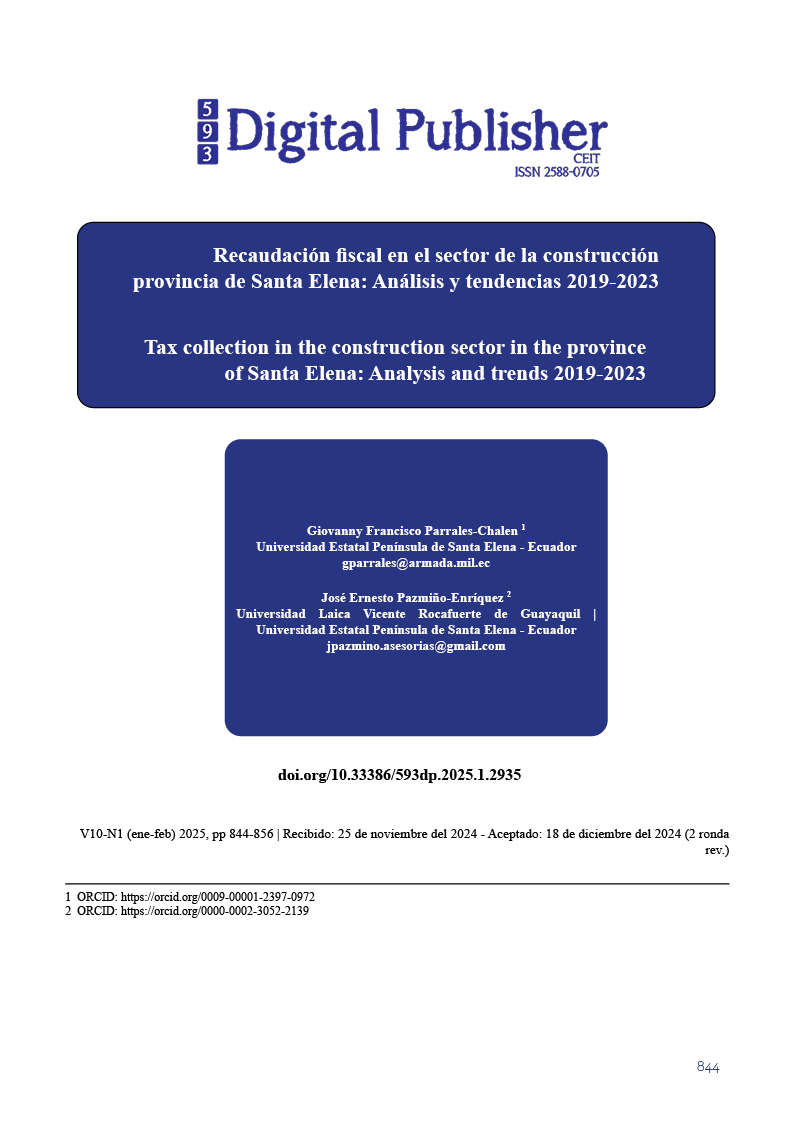Tax collection in the construction sector in the province of Santa Elena: Analysis and trends 2019-2023
Main Article Content
Abstract
The construction sector has been considered an important actor in the socio-economic development of the province of Santa Elena, Ecuador. This study examines tax revenue trends in this sector comprised in the period 2019-2023, based on official statistical data. Tax revenue patterns were analyzed in depth, with a determination of key factors that have a level of influence on revenues especially in the period of the COVID 19 pandemic. The purpose of the study was to analyze tax collection trends in the construction sector in the province of Santa Elena during the period 2019-2023 to optimize fiscal policies and promote sustainable sectoral growth. The methodology includes descriptive and inferential analysis of official tax collection data. The results indicate that there is a clear positive trend in tax collection and the pandemic poses a serious challenge to institutional capacities. This will contribute to the generation of policies and strategies for efficient tax revenue management and promote equitable growth of the construction sector in the province of St. Helena.
Downloads
Article Details

This work is licensed under a Creative Commons Attribution-NonCommercial-ShareAlike 4.0 International License.
1. Derechos de autor
Las obras que se publican en 593 Digital Publisher CEIT están sujetas a los siguientes términos:
1.1. 593 Digital Publisher CEIT, conserva los derechos patrimoniales (copyright) de las obras publicadas, favorece y permite la reutilización de las mismas bajo la licencia Licencia Creative Commons 4.0 de Reconocimiento-NoComercial-CompartirIgual 4.0, por lo cual se pueden copiar, usar, difundir, transmitir y exponer públicamente, siempre que:
1.1.a. Se cite la autoría y fuente original de su publicación (revista, editorial, URL).
1.1.b. No se usen para fines comerciales u onerosos.
1.1.c. Se mencione la existencia y especificaciones de esta licencia de uso.
References
Acosta, J. (2019). Análisis de la recaudación fiscal en el sector de la construcción en América Latina. Revista Latinoamericana de Economía, 50(1), 1-25.
Banco Interamericano de Desarrollo (BID). (2020). Infraestructura y crecimiento económico. Banco Mundial. (2019). Tributación y Desarrollo Económico.
Comisión Económica de las Naciones Unidas para América Latina y el Caribe (CEPAL). (2020). Buen Gobierno y Desarrollo Económico.
Fondo Monetario Internacional (FMI). (2019). Política fiscal y desigualdad de ingresos.
Gallegos, J. (2023). Impacto de la COVID-19 en la recaudación fiscal del sector de la construcción en Ecuador. Revista Ecuatoriana de Políticas Públicas, 5(1), 75-92.
Hernández, M. (2021). Impacto de la política fiscal en el sector de la construcción: Un estudio de caso en Ecuador. Revista Ecuatoriana de Economía, 12(2), 45-68.
Keynes, J. (1936). La Teoría General del Empleo, el Interés y el Dinero.
Martínez, A., Flores, R., y Pérez, J. (2021). Análisis comparativo de la recaudación fiscal en el sector de la construcción: Perspectivas regionales. Revista Iberoamericana de Economía y Finanzas, 9(3), 201-225.
Mendoza, S. (2019). Retos y desafíos de la recaudación fiscal en el sector de la construcción informal. Revista Latinoamericana de Estudios Urbanos y Regionales, 45(135), 87-107.
Musgrave, R. (1959). Teoría de las Finanzas Públicas.
Rodríguez, M. (2020). Políticas fiscales y crecimiento económico: El caso del sector de la construcción. Revista de Finanzas Públicas, 18(2), 125-148.
Sánchez, L., y Ramírez, C. (2020). Gobernanza fiscal y transparencia en el sector de la construcción: Lecciones aprendidas en América Latina. Revista de Economía Aplicada, 28(2), 1-19.
Servicio de Rentas Internas (2020). Base datos Abiertos.
Mirrlees, J.(1971), Diamond, P.(1998), "Teoría de la Imposición Óptima.
Torres, A., & Guzmán, P. (2022). Hacia una recaudación fiscal más eficiente en el sector de la construcción: Un enfoque de big data. Revista Española de Investigaciones Financieras, 25(3), 221-241.
Alm, J(1991), Keen M. (2003), "Teoría de la Administración Tributaria".
Banco Mundial (2020) , "Enfoque de Gobernanza Fiscal".



